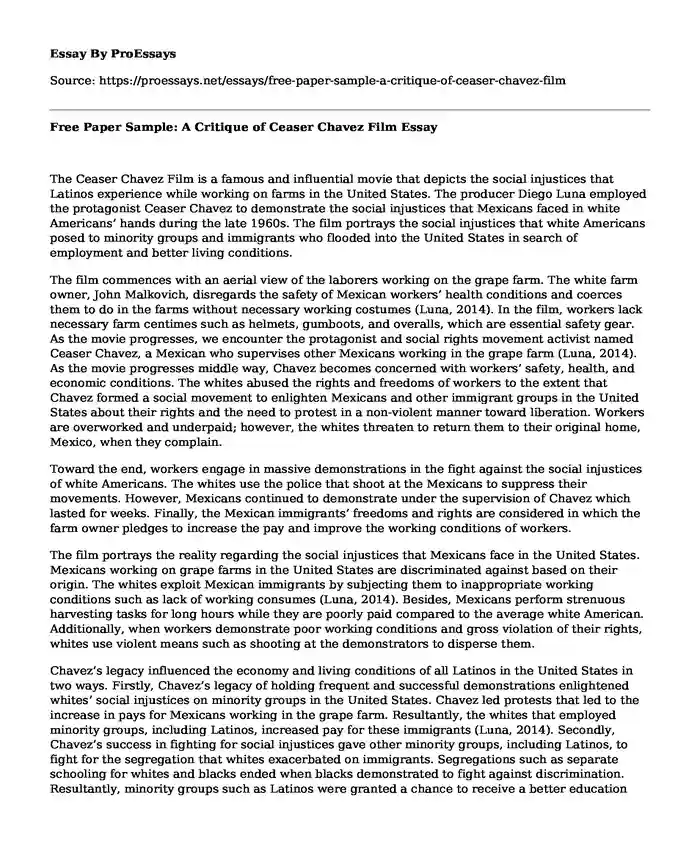The Ceaser Chavez Film is a famous and influential movie that depicts the social injustices that Latinos experience while working on farms in the United States. The producer Diego Luna employed the protagonist Ceaser Chavez to demonstrate the social injustices that Mexicans faced in white Americans’ hands during the late 1960s. The film portrays the social injustices that white Americans posed to minority groups and immigrants who flooded into the United States in search of employment and better living conditions.
The film commences with an aerial view of the laborers working on the grape farm. The white farm owner, John Malkovich, disregards the safety of Mexican workers’ health conditions and coerces them to do in the farms without necessary working costumes (Luna, 2014). In the film, workers lack necessary farm centimes such as helmets, gumboots, and overalls, which are essential safety gear. As the movie progresses, we encounter the protagonist and social rights movement activist named Ceaser Chavez, a Mexican who supervises other Mexicans working in the grape farm (Luna, 2014). As the movie progresses middle way, Chavez becomes concerned with workers’ safety, health, and economic conditions. The whites abused the rights and freedoms of workers to the extent that Chavez formed a social movement to enlighten Mexicans and other immigrant groups in the United States about their rights and the need to protest in a non-violent manner toward liberation. Workers are overworked and underpaid; however, the whites threaten to return them to their original home, Mexico, when they complain.
Toward the end, workers engage in massive demonstrations in the fight against the social injustices of white Americans. The whites use the police that shoot at the Mexicans to suppress their movements. However, Mexicans continued to demonstrate under the supervision of Chavez which lasted for weeks. Finally, the Mexican immigrants’ freedoms and rights are considered in which the farm owner pledges to increase the pay and improve the working conditions of workers.
The film portrays the reality regarding the social injustices that Mexicans face in the United States. Mexicans working on grape farms in the United States are discriminated against based on their origin. The whites exploit Mexican immigrants by subjecting them to inappropriate working conditions such as lack of working consumes (Luna, 2014). Besides, Mexicans perform strenuous harvesting tasks for long hours while they are poorly paid compared to the average white American. Additionally, when workers demonstrate poor working conditions and gross violation of their rights, whites use violent means such as shooting at the demonstrators to disperse them.
Chavez’s legacy influenced the economy and living conditions of all Latinos in the United States in two ways. Firstly, Chavez’s legacy of holding frequent and successful demonstrations enlightened whites’ social injustices on minority groups in the United States. Chavez led protests that led to the increase in pays for Mexicans working in the grape farm. Resultantly, the whites that employed minority groups, including Latinos, increased pay for these immigrants (Luna, 2014). Secondly, Chavez’s success in fighting for social injustices gave other minority groups, including Latinos, to fight for the segregation that whites exacerbated on immigrants. Segregations such as separate schooling for whites and blacks ended when blacks demonstrated to fight against discrimination. Resultantly, minority groups such as Latinos were granted a chance to receive a better education that led to well-paying jobs.
Reference
Luna, D. (2014). Cesar Chavez. Canava Films. Retrieved 14 September 2020 https://youtu.be/VuLXuoN1hh4
Cite this page
Free Paper Sample: A Critique of Ceaser Chavez Film. (2023, Dec 13). Retrieved from https://proessays.net/essays/free-paper-sample-a-critique-of-ceaser-chavez-film
If you are the original author of this essay and no longer wish to have it published on the ProEssays website, please click below to request its removal:
- Film Analysis Essay on Up In the Air
- Social Structures of Japan Essay Example
- Essay Sample on Texas Rising
- Sources and Uses of Cash Paper Example
- Essay on Love and War Unite in Leonato's Home: Claudio and Hero's Romance
- To Kill A Mockingbird - Movie Analysis Essay
- Essay Sample on Characteristics of Healthy Relationships







